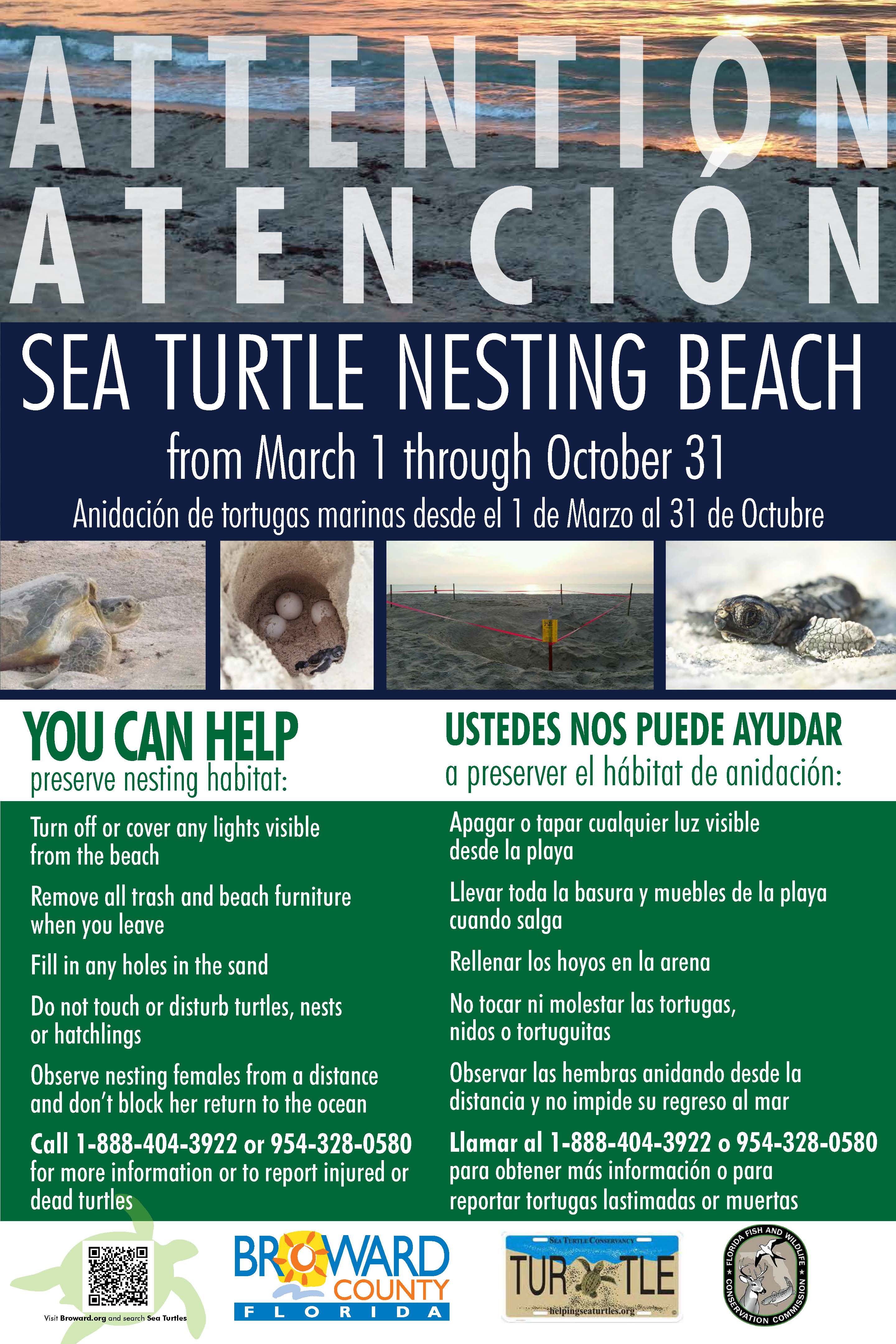Broward County Receives Grant for Informational Sea Turtle Signs at Public Beach Access Points
The Sea Turtle Conservancy has awarded Broward County a grant to design, produce, and install permanent informational sea turtle signs at public beach access points throughout the County. Installing educational signs will help local sea turtle nesting populations by delivering information directly to beach goers utilizing nesting habitat areas and informing those who may unknowingly be impacting them. The signs will also serve as a tool to help reduce human manipulation and interference with sea turtle nesting sites by promoting safe practices. Municipalities will help identify priority locations based on the amount of pedestrian traffic and nesting activity within the vicinity of the access point.

Turn off or cover any lights visible from the beach
Lighting can deter a mother from nesting and if a female is unable to comfortably nest after multiple attempts, she will resort to suboptimal spots or she may even deposit her eggs directly into the ocean. Hatchlings are also impacted as they scurry out of the sand toward the brightest light, an instinct that served them well when the brightest lights were the reflections of moonlight and stars on the ocean. Today, artificial lights from restaurants, hotels and streets draw them inland where they end up exhausted and trapped in sewers or impacted by other manmade structures.
Remove all trash and beach furniture when you leave
It is estimated that there are 100 million tons of plastic in oceans around the world, and that 60 billion pounds will be produced in this year alone. Plastic bags, bottles, balloons, degraded buoys, packaging materials and food wrappers all contribute to the debris that could be ingested and accumulated in marine animals. Many sea turtles have been killed by consuming debris as the plastic bags or fishing line are still in their stomachs as turtles have downward facing spines in their throats which prevent the possibility of regurgitation and the plastic gets trapped in their stomach. Additionally, plastic bags closely resemble jellyfish when floating in the ocean. This is problematic as jellyfish are one of the leatherbacks favorite snack.
Beach furniture should be removed from the beach whenever possible as it can entrap nesting mothers and hatchlings. Additionally, beach furniture and other recreational equipment (e.g. cabanas, umbrellas, and small boats) can reduce nesting success by deterring a nesting mother due to the obstacle it creates on the beach.
Fill in any holes in the sand
Tire ruts and deep crevices in the sand can extend the time it takes a hatchling to reach the ocean making it more prone to predation or exhaustion. If the hole or rut is sever enough it can even entangle or trap a hatchling, mother, or human.
Do not touch or disturb turtles, nests or hatchlings
It is against the law to touch or disturb nesting sea turtles, nests, and hatchlings as they are protected by both the Federal Endangered Species Act and the Florida Marine Protection Act. Violators could potentially face fines and jail time.
Observe nesting females from a distance and don’t block her return to the ocean
Call 1-888-404-3922 or 954-328-0580 for more information or to report injured or dead turtles
These signs were funded in part by a grant awarded from the Sea Turtle Grants Program. The Sea Turtle Grants Program is funded from proceeds from the sale of the Florida Sea Turtle License Plate. Learn more at www.helpingseaturtles.org, and for more information on how to help create a more sustainable environment for sea turtles, please contact the Broward County Sea Turtle Conservation Program at 954-519-1255.
